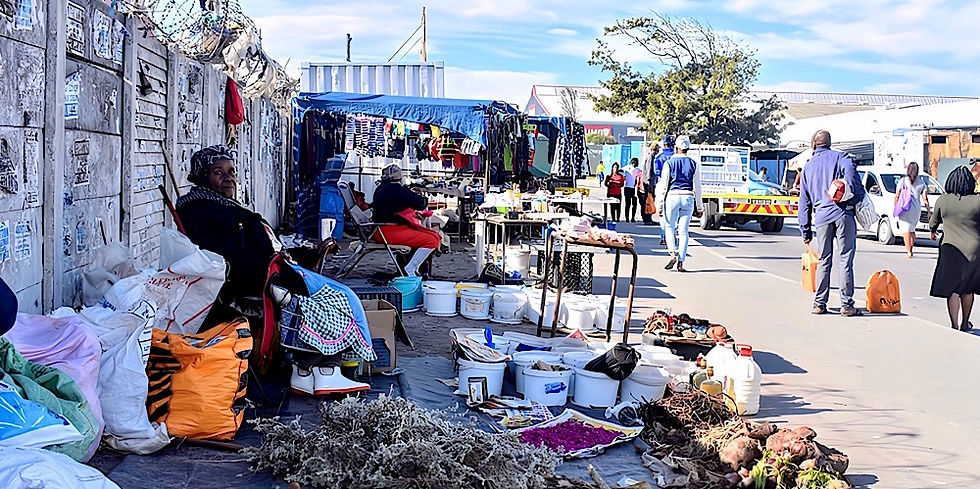City's Informal Trading Plan Faces Crucial Test Amid Congestion Crisis
- Pedi

- May 27, 2021
- 3 min read
The City of Cape Town's ambitious Informal Trading Plan for the congested Protea/Stock Road area is facing a critical test as it seeks to address the persistent challenges that have arisen due to the proliferation of informal traders. The plan, which is now ready for review by the general public, represents a potential turning point for both informal traders and formal businesses, who have long struggled to coexist in the bustling commercial hub.

Formal businesses in the Philippi area are ringing alarm bells over the current informal trading situation, citing congestion as the primary impediment. The congestion extends beyond affecting pedestrians, posing a significant obstacle to vehicular traffic. Trading stalls occupying pavements have forced pedestrians into the streets, worsening an already dire traffic situation. Commercial vehicles in Protea and Stock Roads often come to a grinding halt, incurring financial losses for business owners and even making them susceptible to criminal activities such as hijacking. To make matters worse, the overcrowded trading spaces have led to extensive littering issues.
In a recent virtual meeting, the Philippi Economic Development Initiative (Pedi) brought together representatives from the Area Economic Development (AED) and medium to large local businesses, including those in waste management, retail, liquor, and manufacturing, to review the City of Cape Town's proposed Informal Trading Plan for Joe Gqabi, Stock, and Protea Roads. The meeting marked a crucial step in the City's stakeholder engagement process.

During this meeting, participants expressed appreciation for being consulted and lauded the information shared by AED. The majority voiced support for the proposed layout of Informal Trading bays, highlighting its potential to alleviate congestion and foster a more organized trading environment.
Among the discussion points, concerns were raised about traffic congestion's adverse effects on the movement of bulk transport vehicles, particularly trucks and lorries essential for local businesses. The City of Cape Town, in conjunction with AED, is set to finalize a formal public participation process. This process will include placing advertisements in the local newspaper to invite comments and input from the public and other stakeholders. An Open Day, scheduled for Thursday, June 3, will provide an opportunity for stakeholders to examine Informal Trading Plan layout maps and submit their feedback.
Pedi, the implementation partner, is poised to develop innovative programs aimed at addressing traffic congestion and safety challenges in the Philippi Industrial/Commercial zone. This commitment underlines the city's dedication to finding effective solutions to the pressing issues faced by informal traders and businesses alike.

Amid these discussions, informal traders have not been silent. Noluvuyo Gungqayo, a Protea Road trader, underscored the need for organized trading spaces, complete with shelters. Gungqayo said, "We want to remain here because our customers are here. We need shelters to trade in an organized space."
Bongiwe Gom, another Protea Road trader, highlighted the financial burden of renting tents daily and shared, "I have been trading here for more than 15 years, and the tents we use are costing us because we have to pay R40 every day to people to install them in the morning and take them down in the afternoon."

Nombuyiselo Deliwe, a trader at the Joe Gqabi bus terminus, emphasized the financial losses incurred during adverse weather conditions and the need for shelters to ensure daily operations. Deliwe stated, "We lose a lot of money when it is too windy or rainy, but if we get shelters we'll be able to operate every day."
Mthuthuzeli Jika, a photographer at the Joe Gqabi bus terminus, pointed out the challenges posed by inclement weather conditions and stated, "I take photos for IDs, license renewals, and passports. It's difficult to do this when it's raining."
The fate of informal traders and formal businesses in the congested Protea/Stock Road area hangs in the balance as the City of Cape Town's Informal Trading Plan faces its crucial test. The forthcoming public participation process will be a pivotal juncture in shaping the future of this bustling commercial hub and its diverse stakeholders.
Story and photos by Buziwe Nocuze.

